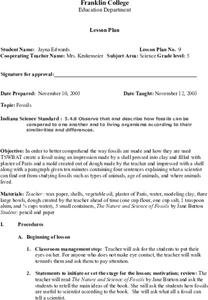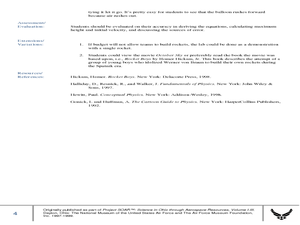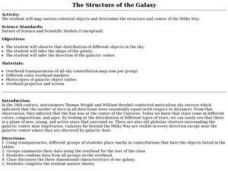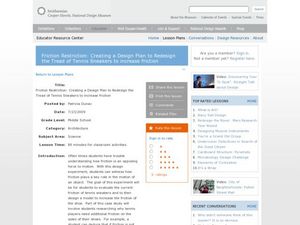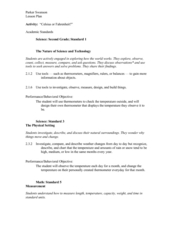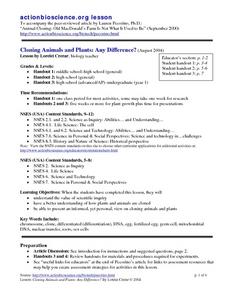Curated OER
Identifying Clouds
Pupils work in groups to research and prepare a report on cloud types. They present their findings to the class and take a group quiz competing for points. Students go outside and determine which type of clouds are visible on that day.
Curated OER
Fossils
Fifth graders create a fossil using an impression made with a shell pressed into clay and filled with plaster of Paris and a mold made out of dough and impressed with a shell. They also will receive a paragraph which contains four...
Curated OER
Can You Beat Jet Lag?
Learners examine the health condition of jet lag. Using mealworms, they test the effect of light on the development of them into adults. They answer discussion questions and examine the relationship of age and one's activity level.
Curated OER
Does Shape Affect Drag?
Students study drag and how it affects a parachute in the sky. In this parachutes instructional activity students build models and compare their drag.
Curated OER
Helium Balloon Race
Students determine the force of a helium balloon that allows it to rise a specific distance. For this helium lesson students calculate the amount of paper needed to construct a weight and determine the density of a piece of...
Curated OER
Edible Wild Plants
Students explore the benefits of recognizing edible wild plants. In this wild plant lesson plan, students collect, make ready and eat edible plants. Students answer questions about the plants.
Curated OER
Is There A Fungus Among Us?
Sixth graders classify fungus into two different groups. In this fungus activity, 6th graders collect as many pieces of fungus as possible. Students then classify these pieces of fungus as saprophytic or parasitic.
Curated OER
A Peek at the Past: Gradualism vs. Punctuated Equilibria
Students consider two sets of simulated fossils (caminalcules) that are provided as cutouts. They arrange them on two time scales. One set produces a visual example of gradualism, the other shows punctuated equilibria.
Curated OER
Why Cladistics?
Students explore how biological classification is intimately associated with evolution.
Curated OER
Island Biogeography and Evolution
Students develop likely phylogenies for seven related populations of lizards living on the Canary Islands using real data. They organize charts, and record the data for geography, geology, morphology, and molecular genetics.
Curated OER
Finding Mean, Mode and Median in the Computer Lab
Learners create spreadsheets which will display and figure mean, median, and mode of a set of numbers.
Curated OER
Deadly Disease among Us
Students recognize that infectious diseases are a continuing problem among all human populations. They define and give examples of emerging infectious diseases. Students define and give examples of re-emerging infectious diseases.
Curated OER
Rockets: Kinematics or Energy?
Students construct model rockets, measure and record the height of the launch. In this creative lesson students use different methods to calculate velocity and height data from their launched rockets.
Curated OER
PATTERNS IN TIME
Students build a realistic sense of geological time, seek clues of transition fossils and find them. In this investigative lesson students complete several activities and worksheets on fossils.
Curated OER
The Structure of the Galaxy
Learners infer the galaxy shape. In this structure of the galaxy lesson students observe the distribution of objects in the sky and answer questions.
Curated OER
We All Need Trees
Students complete a guessing game. For this tree products instructional activity, students view various household items and try to determine if they were made from trees. They discuss their findings and then read books about trees.
Curated OER
Friction Restriction: Creating a Design Plan to Redesign the Tread of Tennis Sneakers to Increase Friction
Young scholars evaluate the friction of tennis sneakers and redesign them to increase friction. For this physics lesson, students calculate starting, sideways and forward stopping friction. Using quantitative data, they prove that...
Curated OER
Celsius or Fahrenheit?
Second graders create a thermometer. In this Celsius or Fahrenheit lesson plan, 2nd graders create an individual thermometer to use for measuring the temperature. Students convert the outside temperature.
Curated OER
Fortune Teller Fish
Students demonstrate how to create and test a hypothesis. They design an experiment and set up a variable, experimental group and control group.
Curated OER
Using Spectrophotometers to Examine Photosynthetic Rates
Students examine how photosynthetic rates can change by using different qualities of light. They practice using spectrophotometer and the scientific method to detect the absorbance values in light treatments.
Curated OER
Cloning Animals and Plants: Any Difference?
Students examine the process in which plants and animals are cloned. They compare and contrast the two procedures and determine if there is a difference. They share their views on cloning to the class.
Curated OER
Fingerprints
Students analyze their fingerprints. In this fingerprint lesson, students make prints and observe the patterns for arches, loops, and whorls. They write a brief autobiography about themselves titled "I'm Thumbody."
Curated OER
Totally Termites
Young scholars explore the world of termites, their adaptations, and anatomy. They examine the property risks of termites and how pest control professionals manage termite problems.
Curated OER
Building on the Past
Students consider how the scientific advances of the past have contributed to the science topics reported on today in the Science Times section. After reading a current science article, they compare and contrast the way science was...
Other popular searches
- History and Nature of Science
- The Nature of Science
- Nature of Science Biology
- Nature of Science Inquiry
- Nature of Science Physics
- History Nature of Science
- Science Patterns in Nature
- Genetics Nature of Science
- Teaching Nature of Science
- Nature of Science Weather
- Genetic Nature of Science
- Science and Nature



